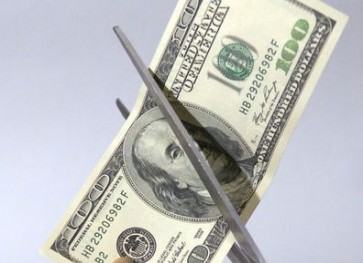FDI SLUMP
Foreign direct investment (FDI), a key component of Bulgaria's hopes for a speedy economic revival, continued to decline in the first four months of the year. Factoring in the payments made by Bulgarian companies on their foreign debt, the investment figure shows a net outflow of funds from the country.
Data from the Bulgarian National Bank on the balance of payments for the January-April period showed a net outflow of 62.5 million euro, compared to an inflow of 378.9 million euro in the same period of 2009, when the country was still in recession.
The data showed a clear trend that Bulgarian companies were sending money abroad. In April alone, the figure was 254 million leva, taking the cumulative amount for the year so far to 566 million euro.
The bulk of that outflow was made up by banks - unable to find good-enough projects to lend to, the banks placed their funds in deposits abroad.
But foreign companies were also withdrawing their deposits, albeit at a slower pace than in 2010, as part of that outflow was funds from parent banks for their Bulgarian subsidiaries. In April, foreign companies withdrew 130 million euro worth of deposits; the total withdrawal since the start of the year was 617 million euro.
The capital account thus had a deficit of about 1.17 billion euro in January-April, compared to 569 million euro in the same period of 2010.
Analysts said that the data was proof of the unsustainability of the model on which Bulgaria built its strong economic growth before the outbreak of the global financial crisis in 2008. It was based on lending growth and investment in construction and real estate, but now that banks had no new projects to lend to, they were forced to send their money abroad.
Economist Lyubomir Hristov said that the outcome could have been avoided if during the era of economic growth, Bulgaria pursued policies to increase qualifications, labour productivity and added-value.
"In the first decade of the 21st centure, Bulgaria was a 'happy shepherd' because the boom period lasted three years. If it went on just a little longer, we would have been facing the same problems as the Baltic countries and Ireland. We did nothing to prevent the overheating of the economy in 2008," he told Dnevnik.
The capital account deficit was partially offset by the current account surplus, a reversal of roles from the pre-crisis years. During the economic boom, the current account deficit grew from year to year, fuelled by the imports that far outpaced Bulgarian imports. Those deficits were covered by the large capital account surpluses, which came from FDI and the cheap loans that had spurred imports in the first place.
Nowadays, the current account deficit surplus and capital account deficit show that both consumption and investment have stalled in Bulgaria.
"The Government's actions hurt the investment climate, but investment is not growing on a global scale and Bulgaria is subject to this global trend. For us, recession will not be over until investment begins growing anew," according to economist Georgi Stoev from think-tank Industry Watch.
"But Bulgaria is a small country and during a global recession, even one sign of improvement can bring enough investors to make a difference. Such a sign can be entry to the euro zone waiting room ERM-2, accession to the Schengen area or other positive outcomes of Government policies," he said.
For the first four months of the year, the current account surplus was 214.9 million euro, a swing from a deficit of 726.1 million euro in January-April 2010. This swing is the main reason for the reduction in the balance of payments deficit to 923.1 million euro, compared to 1.08 billion euro in the same period of 2010.
The services sector was the saving grace of the current account, receiving 335.5 million euro in revenue from abroad in April alone. For the year so far, the amount stood at 1.21 billion euro, an improvement of 20 per cent on the same period of 2010.
Although the outflow in the services sector also increased - to 246.8 million euro in April and 980.1 million euro for the first four months of the year - the sector showed a surplus both in April and cumulatively since the start of the year.
The bad news was that Bulgaria once again had a trade deficit after April - 177.1 million euro for the month and 124 million euro for the year so far.
Despite the Cabinet's declared priority to speed up privatisation of state assets, no new deals have been announced, bringing no new investment through what once was one of the main channels of incoming FDI in the country.









